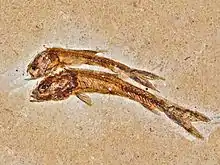| Dastilbe Temporal range: Aptian ~ | |
|---|---|
 | |
| Dastilbe fossil from Brazil | |
| Scientific classification | |
| Domain: | Eukaryota |
| Kingdom: | Animalia |
| Phylum: | Chordata |
| Class: | Actinopterygii |
| Order: | Gonorynchiformes |
| Family: | Chanidae |
| Subfamily: | Chaninae |
| Genus: | †Dastilbe Jordan 1910[1] |
| Type species | |
| Dastilbe crandalli Jordan, 1910 | |
| Species | |
| |
Dastilbe is an extinct genus of prehistoric bony fish from the Aptian.
Species
Description
Dastilbe could reach a length of 25–60 millimetres (0.98–2.36 in), with a maximum length of about 150 millimetres (5.9 in). It was probably an anadromous fish, tolerant of hypersalinity and subjected to frequent mass mortality. Larger individuals of this predatory fish fed on small fishes and probably they were also cannibalistic.[2]
Distribution
Dastilbe was a primitive gonorynchiform fish widespread in Gondwanaland. Fossils of this fish have been found in the Aptian stage of the Lower Cretaceous Cabo, Codo and Crato Formations of northeastern Brazil and in the Lower Cretaceous of Africa.[3][2]
Taxonomy
The type species Dastilbe crandalli was described by the American ichthyologist David Starr Jordan from specimens collected in Brazil, up to four species have been suggested as comprising Dastilbe but other authorities have suggested that the genus is monotypic, comprising a single phenotypically plastic species D. crandalli.[2]
See also
References
- 1 2 The Paleobiology Database
- 1 2 3 4 Davis, Samuel P. and David M. Martill - The gonorynchiform fish Dastilbe from the Lower Cretaceous of Brazil
- ↑ Sepkoski, Jack (2002). "A compendium of fossil marine animal genera". Bulletins of American Paleontology. 364: 560. Archived from the original on 2011-07-23. Retrieved 2009-02-27.